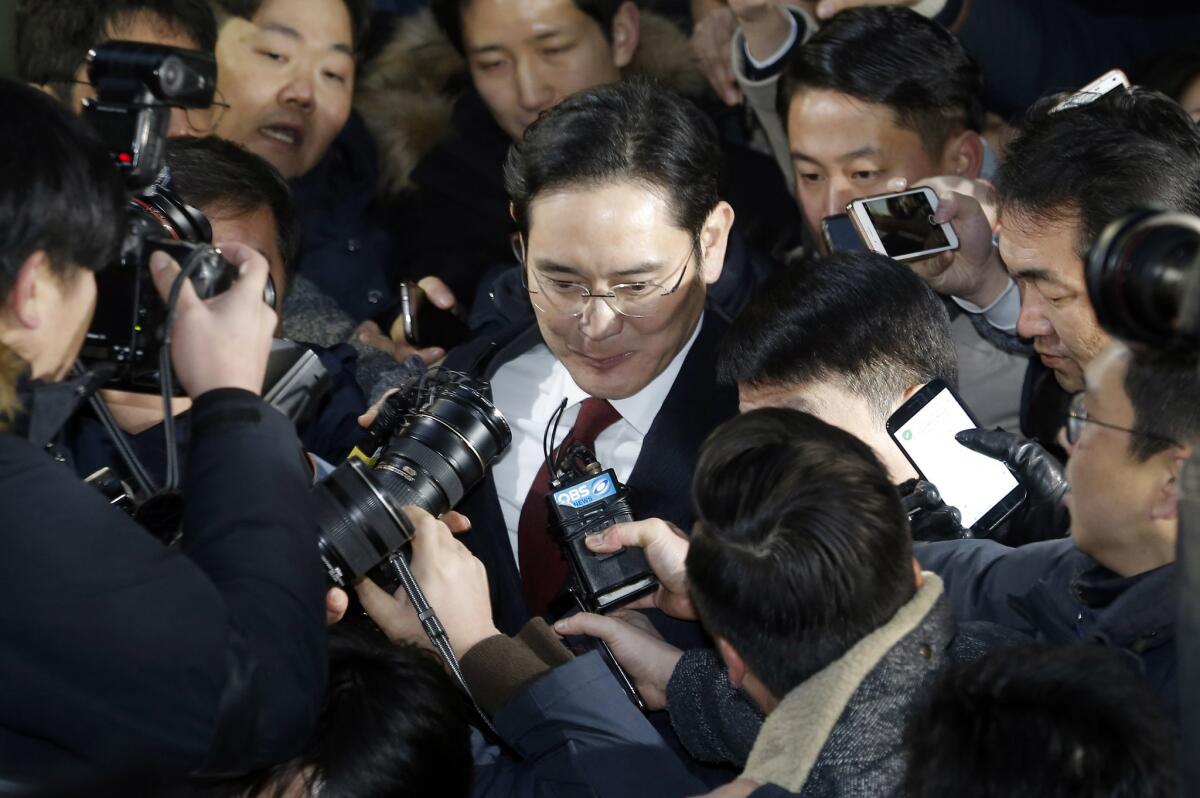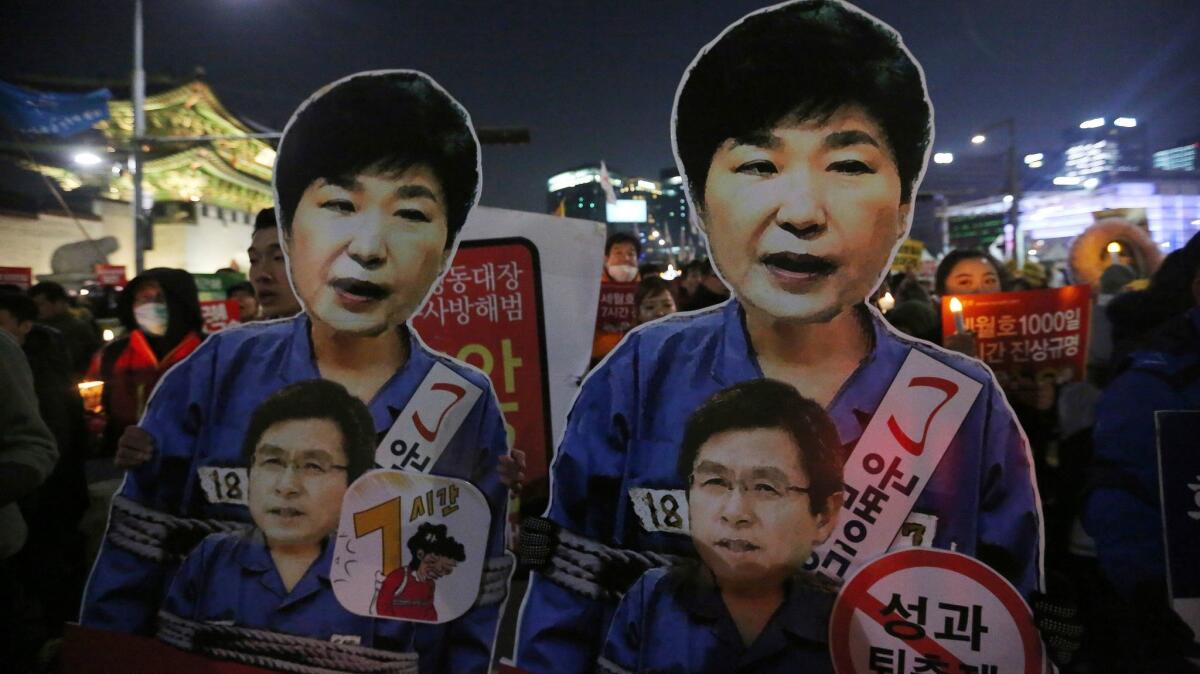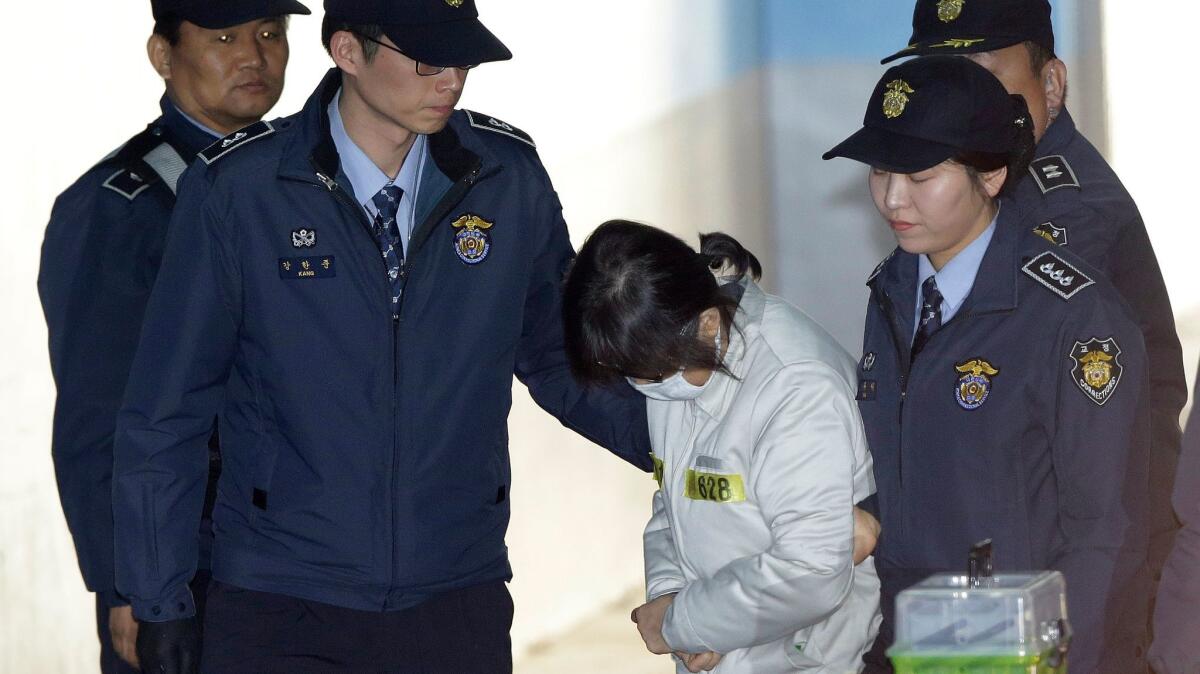South Korean prosecutors seek to arrest Samsung’s vice chairman following president’s impeachment

- Share via
Reporting from Seoul — South Korean prosecutors on Monday sought a warrant for the arrest of the Samsung Group’s de facto leader — one of the nation’s wealthiest and most-powerful executives — in a bribery case related to last month’s impeachment of the country’s president.
Investigators allege that Lee Jae-yong, vice chairman of Samsung Electronics Co., improperly directed company funds to a confidant of the impeached president, Park Geun-hye — perhaps in an effort to solidify his dynastic control over the tech giant, which is South Korea’s largest company.
The prosecutors say that Lee, the grandson of the late Samsung founder, directed the funds to Park’s friend, Choi Soon-sil, to curry favor with the government. In return, the prosecutors allege, he wanted support for a controversial 2015 merger between two company affiliates.
Rhee So-eui, a company representative, said Samsung did not make contributions to receive favors.
“In particular, we find it hard to accept the special prosecutor’s argument that Samsung has made improper requests related to the merger of Samsung affiliates or the leadership transition,” Rhee said. “We believe the court will make the appropriate judgment on this matter.”
If the arrest warrant is issued and leads to an indictment, these would be the latest criminal charges in an unprecedented power-abuse scandal that has rocked South Korea’s political system, leading to historic street protests in recent months.

“This thing is metastasizing all out of control,” Robert Kelly, an associate professor at Pusan National University, said of the scandal. “Every day there’s some new revelation.”
South Korea’s national legislature last month voted to impeach Park, who is suspended from daily presidential duties and, for now, remains immune to criminal charges. A constitutional court is weighing whether to permanently remove Park, whose appointed prime minister is the acting head of state.
Park has apologized repeatedly for the scandal but denied acting outside the national interest. She has also refused to cooperate with the various investigations into her actions.
South Korea has a long history of charging executives at its massive, family-controlled companies, known as chaebol, which control a sizable portion of the nation’s retail and manufacturing economy.
Yet the allegations against the Samsung chief, who is known as Jay Y. Lee in the West, stand out because of the firm’s local and global prominence — and as a sign that more business moguls tied to the scandal could face criminal scrutiny.
“The accusations against Jay are so common for Korean chaebol heads they’re more like a rite of passage,” said Geoffrey Cain, a Seoul-based journalist currently writing a book about Samsung’s empire. “But this time it’s a lot more significant.”
Cain said the allegations, if they lead to a conviction, could dislodge Lee as the company’s de facto leader. “That would be groundbreaking in South Korea, since it’s almost unheard of for a ruling family to be pushed out of corporate power.”
Kelly, the Pusan National University professor, said South Korea’s government has a history of meddling in economic matters, creating an environment that invites corruption. “It’s always putting businessmen and government bureaucrats around a table talking about money,” he said.
Still, he said the case involving Samsung “carries a lot of weight.”
“You’ve heard Korea referred to as a Republic of Samsung,” he said. “This is something that, quite honestly, could have good political side effects, which is taking down Korea’s largest chaebol, which has been used to a certain amount of impunity.”
The special counsel in the case has probed whether the tech giant, the nation’s largest conglomerate, donated more than $20 million to firms and foundations associated with Choi, the disgraced presidential confidant.

Choi, whose late father was an influential cult leader in South Korea, is standing trial on an array of allegations that she used her influence with Park to obtain funds from numerous business, including Samsung. Investigators want to know whether the payments led to the National Pension Service’s decision to back a controversial merger in 2015 between two Samsung affiliates, Samsung C&T Corp., and Cheil Industries Inc.
Prosecutors on Monday charged Moon Hyung-pyo, the chairman of the National Pension Service, with perjury and abuse of authority.
The merger was seen by corporate analysts as an effort to solidify Lee’s dynastic succession over the tech giant’s vast holdings. His title is vice chairman, but he’s essentially running the Samsung Group after his father’s incapacitating heart attack in 2014.
Prosecutors last week called the younger Lee, a tall, bespectacled man who attended Harvard Business School, to discuss the bribery allegations. He reportedly answered questions, off and on, for 22 hours. Some reports suggested Lee, worth an estimated $6 billion, was allowed only a $5 box meal during the grilling.
Lee, with a polite smile and escorted by a lawyer, arrived at the counsel’s office about 9:30 a.m. Thursday, shuffling through a crush of reporters. “I am deeply sorry, and I apologize to the Korean people for failing to put our best face forward due to this incident,” he told reporters before bowing and entering the office. He didn’t leave until the next morning — again amid a mass of media.
During the questioning, a spokesman for the special counsel said prosecutors had been considering whether to charge Lee with bribery and perjury. Prosecutors had already asked him in mid-December not to leave the country.
Unlike in the United States, many high-profile South Korean investigations involving large companies or political figures play out publicly. Prosecutors leak investigative details, conduct high-profile searches and summon suspects for questioning with dozens of reporters present — public displays that typically foretell criminal charges.
The case against Lee, however, remained a shock — despite the weeks of public hints that charges could be coming.
The company and Lee have said they made payments to Choi’s foundations — even reportedly buying a nearly $1 million dressage horse for her daughter, a noted equestrian athlete. The firm has said the payments were philanthropic and supported national sports programs, denying accusations that it sought to ease the merger.
The Samsung Group is no stranger to criminal crises at the top of its empire.
Lee’s father, chairman Lee Kun-hee, took over Samsung in 1987. He was forced to resign in 2008 amid charges related to a slush fund to promote Samsung’s interests. He was fined nearly $100 million and served a suspended sentence, even though prosecutors recommended that he be sent to prison. The elder Lee regained control of the company in 2010, but has been incapacitated since 2014.
The Samsung Group is just one of several South Korean conglomerates that donated funds to Choi’s foundations, raising the specter that other corporate titans could also be felled by the scandal.
Stiles is a special correspondent.
ALSO
Turkish cargo plane crash kills at least 37, destroys half of village
5 killed after gunman opens fire at Mexican music festival
One family fought the system and stopped Donald Trump’s first venture in India
UPDATES:
9:05 a.m.: This article has been updated with comments from a Samsung representative.
This article was originally published Jan. 15, 2017, at 9 p.m.
More to Read
Sign up for Essential California
The most important California stories and recommendations in your inbox every morning.
You may occasionally receive promotional content from the Los Angeles Times.














